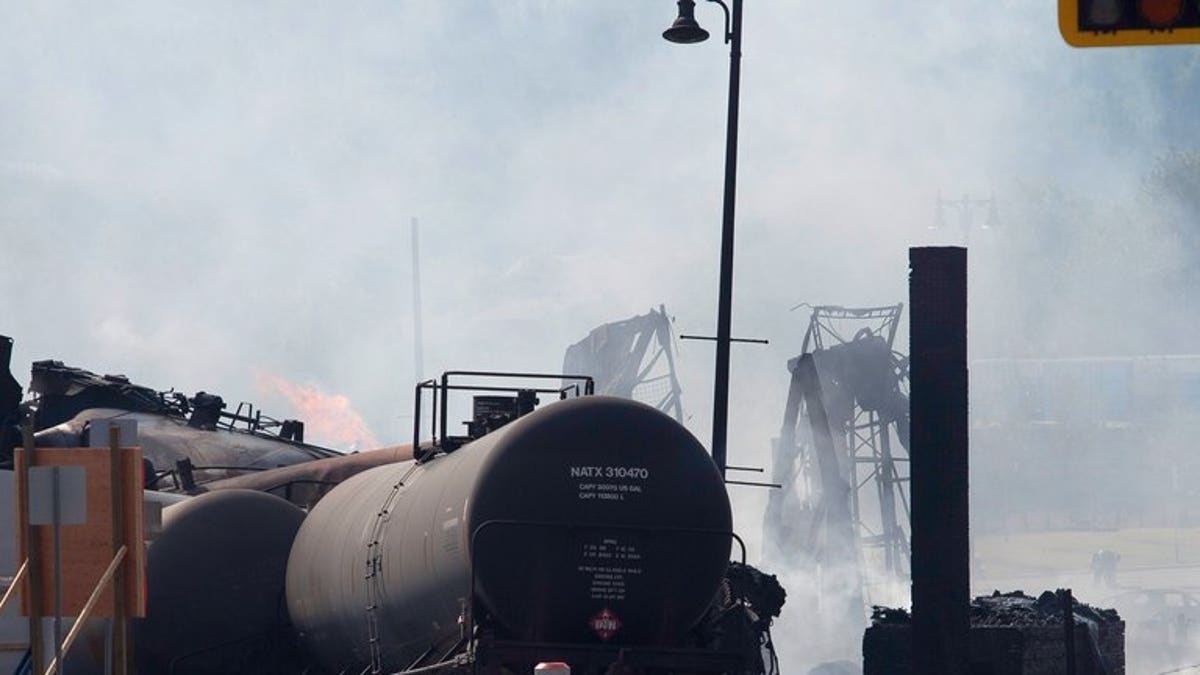
Wreckage continues to burn on July 7, 2013 after a freight train derailed in Lac-Megantic in Canada's Quebec province. Canada's Transportation Safety Board ordered railways Friday to check the brakes on all trains, after a preliminary investigation into the deadly derailment faulted its brakes. (AFP/File)
OTTAWA (AFP) – Canada's Transportation Safety Board ordered railways Friday to check the brakes on all trains, after a preliminary investigation into a deadly derailment in Quebec faulted its brakes.
The regulator also warned operators not to leave trains unattended nor unsecured on main lines, and to review their protocols for transporting dangerous goods.
"The TSB investigation has determined that the braking force applied was insufficient to hold the train on the 1.2 percent descending slope," the Transportation Safety Board said in a statement.
As such, it has asked Transport Canada to review rules for securing trains "in order to prevent unintended movements," it said.
TSB Eastern Canada manager Ed Belkaloul meanwhile told a press conference that "the number of brakes is important, but the quality of the brake pads is also very important."
"Because the brakes are basically manually applied mechanisms, it depends on the strength of the person applying the brakes, (and) it depends on the mechanical state of the various pieces," he said.
The investigation of the Lac-Megantic oil tanker train crash on July 6 will take several more weeks, he added.
The runaway Montreal, Maine & Atlantic Railway train had been parked overnight at the nearby town for a crew changeover when it slipped away, derailed and exploded, flattening part of the picturesque town of Lac-Megantic and killing up to 50 people.
The railway's chairman has said that the disaster appeared to have been caused by an engineer's failure to properly set hand brakes on the train.
The train was carrying crude oil from the Bakken shale fields of North Dakota in 72 tanker cars through the resort town of 6,000 near the Canada-US border to an Irving Oil refinery in New Brunswick.
The Transportation Safety Board has so far inspected the tracks uphill of Lac-Megantic, interviewed the train's lone engineer and others, and sifted through the wreckage of 22 tankers.
Officials are now analyzing the train's recorder and photographs of the scene, conducting metallurgical tests on tanker parts, and using three-dimensional computer modeling to recreate the events.
As well, the oil is being tested to determine its properties in hopes of explaining "the magnitude of the fire and the extent of the explosion," lead investigator Donald Ross said.
Officials are also combing through Transport Canada and Montreal, Maine & Atlantic Railway documents, including train journals and shipping documents, he said.
Belkaloul noted that braking had been faulted in other recent derailments in Canada, which is what prompted the TSB to issue its urgent warning not to leave unattended "trains on grades."
